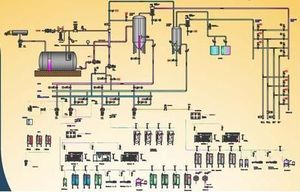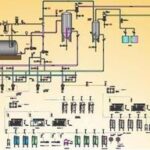Complete Clean In Place solutions
Clean In Place systems are considered fundamental to processing plants where hygiene is the most important factor in the whole production process. In the food and beverage industries, the quality and sanitary conditions of products need to be a certain level by obligation for its commercialization. Having an advanced CIP system is a guarantee which is synonymous with quality and health.
MachinePoint supplies automated Clean-In-Place, Sterilize-In-Place, and Clean-Out-of-Place solutions for the Dairy, Beverage and agro-food industries.
CIP solutions have to be customized to your specific needs, and your specific product and production process. We integrate the solution into your manufacturing process to guarantee unique cleaning recipes for each product residue and equipment type that is being cleaned.
Our objective is to deliver cleaning cycles integrated into your process to help you increase your safety and reduce your costs.
The increase in safety is due to the elimination of human error (and therefore risk of accidents), the elimination of solvents, and the integration of a system that is consistently cleaned and is able to monitor the cleaning. Professional, consistent and repeatable cleaning.
You will reduce costs as you will save in water, chemicals and labor. Up to 75% in savings can be achieved from decreased water consumption, shorter cleaning times that will allow you to increase your manufacturing capacity, and the reduction or even elimination of chemicals.
CIP solutions are consistent and repeatable. The cleaning process will be faster and more secure.
Also, our CIP system contains a product recovery process. Our system recovers and reuses most of the water and chemicals, reducing costs and environmental impact.
SIP: Sterilize in Place
SIP systems use two types of technology to sterilize and sanitize pipes and systems:
System sterilization by steam or hot water
These systems pump very hot water or water vapor throughout the pipes and systems. The temperature and timings are controlled and adapted to obtain complete sterilization.
SIP systems are mostly used for pasteurization systems, and product processing systems. They tend to come ready-integrated within the processing lines and pasteurizers.
Sterilization is achieved by pumping hot water through the system for at least 30 minutes, to guarantee that every single part (Nuts, flanges, etc) reaches high temperatures for a duration of at least 10 minutes.
Chemical sterilization systems
These are the SIP systems that are used for sterilizing packaging lines, packages, big storing tanks, bottling machine, cap machines, etc.
Concentrated peroxide (2% to 30%), acetic acid or a combination of both is injected into the system.
MachinePoint SIP systems have a mixing unit that guarantees exact mixing, and timing control unit to guarantee sterilization.
The importance of Cleaning in Place (CIP) in the industry
Cleaning in place is a process designed to clean equipment and pipelines in their installed location without the need for disassembly. This method involves the use of chemical solutions and/or detergents specifically formulated to efficiently remove residues and contaminants without interrupting production.
Cleaning in place is highly effective in maintaining cleanliness in pipes, tanks, and valves. By using techniques such as high-pressure rinsing and circulating chemical solutions, we can ensure the complete removal of residues and microorganisms.
These substances are effective in dissolving mineral deposits, scale, and persistent organic residues. Additionally, their ability to disinfect and remove biofilms makes them key components of many cleaning solutions in the industry.
At MachinePoint, we understand that cleaning in place can significantly improve the performance and longevity of machinery. By efficiently removing residues that could cause blockages, corrosion, or premature wear, equipment operation is optimized, and the need for corrective maintenance is reduced.
It is widely used in food, pharmaceutical, chemical, and beverage industries, among others, to meet hygiene and food safety standards.





